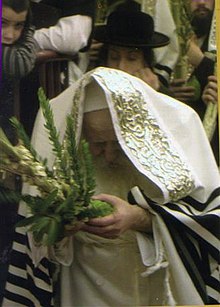Psalm 117
| Psalm 117 | |
|---|---|
| "O praise the LORD, all ye nations: praise him, all ye people. " | |
 Psalm 117, from the Wolfcoz Psalter, c. 820-830. | |
| Other name |
|
| Language | Hebrew (original) |
Psalm 117 is the 117th psalm of the Book of Psalms, beginning in English in the King James Version: "O praise the LORD, all ye nations: praise him, all ye people. ". In Latin, it is known as Laudate Dominum.[1] Consisting of only two verses, Psalm 117 is the shortest psalm and also the shortest chapter in the whole Bible.
In the slightly different numbering system in the Greek Septuagint and the Latin Vulgate version of the Bible, this psalm is Psalm 116.
Text[]
With just two verses and seventeen words and 62 characters in Hebrew (29 in v1 + 33 in v2 is 62), it is the shortest psalm in the Book of Psalms. It is also the shortest chapter in the whole Bible. It is the 595th of the 1,189 chapters of the King James Version of the Bible, making it the middle chapter of this version.
In Hebrew, it is an acrostic poem and is one of the so-called Egyptian Hallel prayers.
Hebrew Bible version[]
| Verse | Hebrew |
|---|---|
| 1 | הַֽלְל֣וּ אֶת־יְ֖הֹוָה כָּל־גּוֹיִ֑ם שַׁ֜בְּח֗וּהוּ כָּל־הָֽאֻמִּֽים |
| 2 | כִּ֥י גָ֘בַ֚ר עָלֵ֨ינוּ חַסְדּ֗וֹ וֶֽאֱמֶת־יְהֹ֘וָ֥ה לְ֜עוֹלָ֗ם הַֽלְלוּ־יָֽהּ |
King James Version[]
O praise the Lord, all ye nations:
praise him, all ye people.
For his merciful kindness is great toward us:
and the truth of the Lord endureth for ever.
Praise ye the Lord.— Psalm 117 King James Version
Uses[]

Judaism[]
Psalm 117 is one of six psalms (113-118) of which Hallel is composed. On all days when Hallel is recited, this psalm is recited in its entirety.[2]
Christianity[]
In Psalm 117, the gentiles are invited to join in praise of God. Christians view this as a fulfillment of God's promise of mercy to the gentiles, pointing to God's promise that all nations would be blessed in the seed of Abraham, who they believe is Christ, as described in the Letter to the Galatians. Galatians 3:16 says "Now to Abraham and his seed were the promises made. He saith not, And to seeds, as of many; but as of one, And to thy seed, which is Christ." Verse 1 is quoted in Romans 15:11.[3]
Catholicism[]
In the Catholic Church, the Rule of Saint Benedict assigns this psalm (116 in the Vulgate) to the Office of Vespers on Monday. Saint Benedict of Nursia generally used four psalms in vespers, but because of the shortness of this psalm, he added a fifth when it was used. However, this psalm is currently used in the Liturgy of the Hours on Saturday of Weeks I and III. The psalm may be sung after Benediction of the Blessed Sacrament, a ritual performed in Catholic[4] and some Anglican churches.
Musical settings[]

Psalm 117, known by the opening words in Latin as Laudate dominum (translated "O, Praise the Lord" or "Praise ye the Lord"), has been set to music by a number of composers, including William Byrd,[5] Johann Sebastian Bach Lobet den Herrn, alle Heiden, BWV 230, Michel Richard Delalande,[6] Marc-Antoine Charpentier, (6 settings), H.152, H.159, H.182, H.214, H.223, H.227, Wolfgang Amadeus Mozart[7] and Robert Strassburg.[8] More recently, it has been set by the Swedish composer Fredrik Sixten. The psalm also forms the introduction of the 90s pop song Happy Nation by Swedish pop group Ace of Base,[citation needed] and a popular arrangement from the Taizé community.[9][10]
References[]
- ^ Parallel Latin/English Psalter / Psalmus 116 (117) Archived 2017-05-07 at the Wayback Machine medievalist.net
- ^ The Complete Artscroll Siddur page 638
- ^ Kirkpatrick, A. F. (1901). The Book of Psalms: with Introduction and Notes. The Cambridge Bible for Schools and Colleges. Book IV and V: Psalms XC-CL. Cambridge: At the University Press. p. 840. Retrieved February 28, 2019.
- ^ The Benedictines of Solesmes, ed. Liber Usualis, p. 1853. New York: Desclee Company, 1961.
- ^ William Byrd, (Gradualia II (1607),) no. 45.
- ^ "Archived copy". Archived from the original on 2015-09-23. Retrieved 2015-10-31.CS1 maint: archived copy as title (link) [archive] p.46
- ^ Rykkvin, Aksel (28 December 2016). "Laudate Dominum (by Mozart) sung by boy soprano Aksel Rykkvin (13 years)". YouTube.
- ^ Robert Strassburg milkenarchive.org
- ^ Laudate Dominum taize.fr
- ^ Le site de la communauté propose une version Midi et les partitions.
External links[]
| Wikimedia Commons has media related to Psalm 117. |
| Wikisource has original text related to this article: |
- Pieces with text from Psalm 117: Scores at the International Music Score Library Project
- Psalm 117: Free scores at the Choral Public Domain Library (ChoralWiki)
- Psalms Chapter 117 text in Hebrew and English, mechon-mamre.org
- Text of Psalm 117 according to the 1928 Psalter
- United States Conference of Catholic Bishops, Praise the LORD, all you nations! Extol him, all you peoples! text and footnotes, usccb.org
- Psalm 117:1 introduction and text, biblestudytools.com
- Psalm 117 – Calling All Peoples to Praise the LORD enduringword.com
- Psalm 117 / Refrain: Alleluia. Church of England
- Psalm 117 at biblegateway.com
- Charles Spurgeon: Psalm 117 detailed commentary, archive.spurgeon.org
- "Hymns for Psalm 117". hymnary.org. Retrieved 10 May 2020.
- Laudate Dominum on YouTube
- Laudate Dominum (Psalm 117) (William Byrd) - Midi files and PDF scores by ChoralWiki
- Laudate Dominum (Psalm 117) (Mozart) - Midi files and PDF scores by ChoralWiki
- Laudate Dominum (Psalm 150) (Ronald Corp) - Excerpt, programme note and PDF score
- Psalms
- Hallel